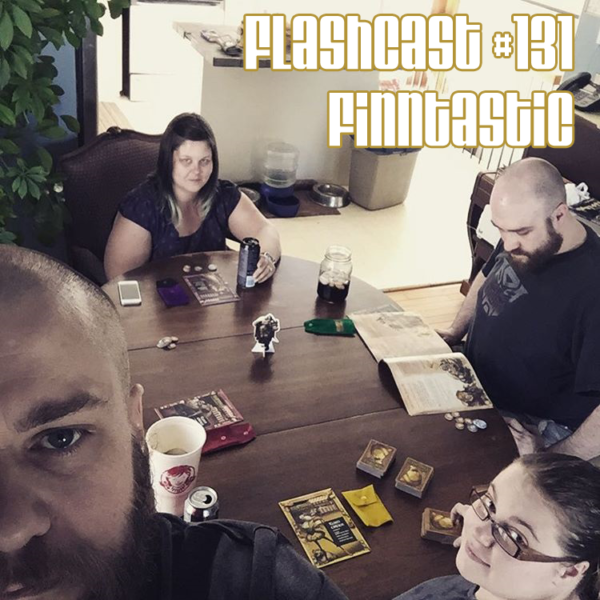Welcome to Flash Pulp, episode four hundred and fifty-four.
 Tonight we present The Broken Circle: a Mother Gran Story
Tonight we present The Broken Circle: a Mother Gran Story
[audio:http://traffic.libsyn.com/skinner/FlashPulp454.mp3]Download MP3
(RSS / iTunes)
This week’s episodes are brought to you by Glow-in-the-Dark Radio!
Flash Pulp is an experiment in broadcasting fresh pulp stories in the modern age – three to ten minutes of fiction brought to you Monday, Wednesday and Friday evenings.
Tonight we revisit old friends dealing with new, unexpected visitors.
The Broken Circle: a Mother Gran Story
Written by J.R.D. Skinner
Art and Narration by Opopanax
and Audio produced by Jessica May
There came a time, well after the majority of Mother Gran’s family had fled the dried silver mines and the plummeting cost of wheat, when she was left to tend her acreage with the help of only fresh-faced Montgomery Smith and Ellen, her youngest granddaughter at twenty-two.
Smith had been a boon to the operation. Though by no means the burliest labourer the farm had seen, he had single-handedly cleared the brush and oak back to the lake that bordered the property, and his aid in the harvest meant having to depend little on the stipend provided by her distant benefactor, Thomas Blackhall.
It was Blackhall who had sent her Smith, and in exchange for the man’s dedication and the paying of a personal debt she had agreed to hold onto volumes of knowledge and artifacts beyond her comprehension. Gran herself was not unfamiliar with the arcane, but hers was a bush education gleaned from family knowledge and the passing wisdom of the occasional vagabond riding the rails through the wilderness. It was just enough schooling to understand the dangers of the items she possessed, and to respect the risk she undertook in keeping them.
Their pact had included an agreement that she would not pry into her obligation, and she held to the terms till the day Kenton Sweet arrived.
The stranger appeared as she was setting a meat pie upon her windowsill, and she watched from behind the curtain’s shadow as Sweet shuffled through the gate and passed the main house without attempt to raise awareness as to his arrival.
Both Smith and Ellen were occupied; he doing his best to fumble his way through a chair repair in the work shed, and she collecting dandelions so they might press them for spring wine.
The pair had been making eyes at each other for the better part of the year, and the aging grandmother often found herself wishing they’d discuss the matter openly instead of pining in their separate silences. She had little patience left for the dallying nature of the age’s courtship.
Ellen’s parents had been brought low by a cholera outbreak in Montreal, and the girl had been shipped to the fresh air and field work of Gran’s plot at the age of ten. She’d been there to see the collapse of the nearby town, and the subsequent sowing of their family to the wind. She’d also been there to witness the arrival of Smith himself, carrying news and calling in those debts owed to Blackhall.
It did not take long for Montgomery to settle. Though young he had seen military service, like many of the overly-excitable and under-parented boys of his era, and the trio’s post-meal evenings were spent in a friendly rhythm of exchanged tales while gathered about the fire: First Mother Gran telling of her youth or some local fairy story; then Smith speaking of his oceanic crossing – where a fellow rifleman had taught every rat on the ship to come to his whistle – or some bit of midnight foolishness he and his comrades had gotten into while vigorously defending the whiskey stills below certain southern public houses; then, finally Ellen would speak of the events of the day in lands both distant and not so distant. She’d befriended, years previous, a mustachioed train engineer by the name of Hanson, and often she would leave a fresh pie, wrapped in old newspaper, at the hilltop watering station, where, in exchange, he would deposit as many broadsheets and penny dreadfuls as he’d been able to collect since his last installment.
Though no longer obligated to wear his uniform Smith took the duties he’d sworn to Blackhall with the earnestness of any soldier lifting a rifle, and Gran sussed early on that this was why, though they sparred amicably on points of history or whose turn it was to handle the dishes, the young man maintained a certain distance from Ellen’s approaching affection.
It’d been four years since his arrival, but it was only three weeks since Ellen had stolen a kiss from him behind the barn, and the pair had been warming themselves on their supposed secret since.
At least this had brought a sliver of a grin to Gran’s face – it was a fool’s joke to think anything might happen within her borders that she was not aware.
She had, for example, spotted Kenton immediately upon his arrival.
Maintaining eighty acres was rough work, but harvests could be completed with the help of hired labour and the rest of the season managed by focused dedication. Such effort was not uncommon in hard times, and a body on the roam who knew anything about field work would be aware of such a farmer’s preoccupation.
From her position behind the half-cocked drape, Gran suspected this was such a visitor. She too could hear the hammering and swearing emanating from the remote work shed, and, even further beyond, Ellen’s stooping form, in yellow spring dress, was clearly visible against the field of green.
Sweet was creeping along the siding of the small garage in which the widow’s husband had stored their beloved show buggy, the interloper’s right hand in his pocket and his left held out before him as if it might somehow deflect the gaze of anyone he happened to encounter.
 Despite her years Gran had never been a woman with much interest in rest. Hoisting hay bales and wrangling swine had kept her wiry limbs taut, and chasing game and running the night fields had kept her feet light.
Despite her years Gran had never been a woman with much interest in rest. Hoisting hay bales and wrangling swine had kept her wiry limbs taut, and chasing game and running the night fields had kept her feet light.
He did not hear her approach, yet he greatly felt the sting of her broom handle landing across his left calf and then his right elbow. The impact upon his arm was enough to draw his hand from his pocket, and, though she had sharp eyes on his grip, she was pleased to find it empty.
“Stand down,” said the stranger, “My name is Sweet – Kenton Sweet – and I am but a simple farmhand come looking for a bit of work in this lush slice of Eden.”
Gran’s toothless gums only acted to exaggerate the raspberry her lips formed in response. “Pfft – Mayhaps I’ve spent the better part of my years scratching at this patch of swamp dirt, but I know a bloody skulker when I see one, ye bloody skulker.”
She had noticed immediately the half-time swing of the hammer in the work shed, then the cessation entirely of its morning-long rhythm – yet Sweet had not. Smith, who’d revealed himself a watchful man notwithstanding his flip nature, had no doubt spotted her crossing of the yard, as it had been only the intruder from whom Gran had wished to obscure her approach.
Montgomery’s reaction had come so quickly that he was still clutching his cudgel as he cleared his throat, drawing the lurker’s attention, but Gran could not be sure her young friend had spotted the stranger’s fingers again drawing into his right pocket.
“Hey!” she said, her broom handle prodding his shoulder in warning, but at that same moment Sweet, reacting to the sight of Smith’s sudden hammer-carrying appearance, yanked forth a well-worn pocket pistol. Surprise and fear guided Sweet’s instincts and, as his firearm’s mechanism dropped into the breech it was only the stick’s nudge that saved Blackhall’s agent from ending his brief life with a third nostril.
Yet it was also, however, just enough of an adjustment that Ellen, approaching the gathering from behind with her basket full of daisies, received the startled shot just above her right eye.
By reflex entirely unconcerned with differentiating between revenge and self-defense, Smith’s hammer landed at Sweet’s temple even before Ellen had fully collapsed.
Then his weapon tumbled from his grip, and his violence was instantly forgotten as he loped to her side with a keening throat.
Silence fell. In the distance the same bugs buzzed, and the same birds cawed, and the same waves lapped gently at the lakeshore. The noon sun would soon be relentless in its assault upon the grass and dirt, and the moon would continue to hover over the horizon, eager to bring darkness to the land.
In that moment, Gran felt the weight of every day she’d known: Every hour she’d laboured against the land, fought against the small minds and quick hands of the local drunks, turned back threats beyond the simple comprehension of the townsfolk who’d shunned her before abandoning their birthplaces entirely.
Perhaps it was the frustration of not having killed him herself – perhaps it was the sorrow of watching Ellen’s too-young blood soak into the earth that had sustained her for so long – but, whatever the case, Gran, for the first and only time, betrayed the trust Blackhall had invested in her.
At seeing her collect her tools Smith assumed she’d set herself to scratching out her granddaughter’s grave, but by midday her work proved she was after a hole already dug. Swinging high the iron nails and cedar logs that made up the cellar’s roof, she descended into the cavern in which she had hidden her burden.
She wept and laughed and searched under the creeping light of the afternoon sun and the hollow glow of the moon’s rise, then she encountered a slip of paper whose edges were rung in skulls and sprouting saplings. Her church Latin was rusty, but the instructions were largely decipherable.
By that time Smith had carried Ellen’s form to the house, no doubt to wrap her in linens and gush his too-closely held adoration for the girl, but Sweet’s body, cold and staring, remained where it had fallen.
Morning was breaking at the edge of the yard as she washed her hands and face in water collected from the rain barrel, and the chill damp helped ease the sting about her exhausted eyes. She rarely slept more than a few hours most evenings, but those brief minutes were one of life’s pleasures she greatly looked forward to.
Still, she would rest easier once her work was done.
Standing beside the dew-dappled corpse, parchment in hand, she ran her tongue across her lips and began her recitation. Her toothless nature, however, lent certain consonants a mushy resonance, and thrice she was forced to repeat a word once she’d belatedly realized its correct pronunciation.
Kenton’s Sweet’s form began to buck, his wound knitting itself shut even as his flailing form snapped and reformed his spine repeatedly. Searing white light gushed from his eyes, and the sound of wind howling across a damned plain rolled from his throat. With the closing of her oration his thrashing dwindled, as did the blaze and roar, but Sweet continued to writhe, and his mouth began to form a much more human screaming.
Gran had prepared for such. Sweet’s pistol was refilled and ready within the broad pockets of her mud-spattered dress.
Recognition, and pleading, came into his eyes as she approached, but she did not hesitate in firing squarely upon his forehead.
He twitched once and was dead.
She allowed herself the space of a single breath, reached across the better part of a century to briefly touch the memory of her mother chiding her that a thing worth doing was worth doing right, then began her second reading.
Her diction was clearer, and her tongue moved more surely across the words, yet there came a moment, among a tangle of ‘U’s and ‘L’s, in which her jaw gnashed and gnarled, and she knew she had broken hard from the intention of the text.
Still, she was closer to finished than beginning, and she was unsure of what might result from leaving the job half done.
This time as Sweet came about there was no chance for screaming – instead blood drained in gouts from his mouth and nose, thick with a porridge of the poorly reformed brain matter that had surrounded her bullet.
Worse, her exhaustion had led her to skip a critical step, and she had not reloaded the weapon in question. As Kenton took to all fours and splashed scarlet across the muck, she retrieved her shovel and laid it heavily across his neck.
In moments Gran was fully collected and ready for the third attempt, and her oration was as smooth as the night breeze running its fingers through the tall grass.
Again the light appeared, but this time its intensity was a glow instead of a torrent, and the round shot with which she had penetrated his skull rolled gently down the bridge of Sweet’s nose as he sat upright.
His eyes were confused, but appeared otherwise human.
“Kenton?” asked Gran.
“Yes?” replied the resurrected man.
“Any aches and pains? Any lingering concerns?”
“No aches or pains, but many lingering concerns. How is it that I came to be seated here? My last memory is of -”
Then she hit him again with the shovel and finally took to digging a grave.
It was not that she thought it the right thing to do – it was not that she thought it the just thing to do – yet she certainly found it to be the most satisfying of the choices presented to her. There would be much to explain to Blackhall at his next arrival, but, in all fairness, surely he would not want a known murderer wandering about claiming he’d had a resurrection ritual practiced upon his corpse a number of times before his escape?
Gran could not say what the bushman’s response would be, but in the short term she did not care: There was one last repetition of the rite to carry out, and then a long nap ahead of her. Once all was right again she could worry about all that was wrong in the correction’s wake.
With aching yet silent feet she approached the farmhouse and the lovers sheltered within.
Flash Pulp is presented by http://skinner.fm, and is released under the Creative Commons Attribution-Noncommercial 3.0 Unported License.
Intro and outro work provided by Jay Langejans of The New Fiction Writers podcast.
Freesound.org credits:
Text and audio commentaries can be sent to comments@flashpulp.com – but be aware that it may appear in the FlashCast.
– and thanks to you, for reading. If you enjoyed the story, tell your friends.

 Monk was beginning to spot the subtle differences between the locals. Though there seemed little sign in variation in the length of their fur, they’d taken to shaving their faces and arms in elaborate patterns. Ahead of him stepped a tall-necked Goliath with trimmed bands of broadening width climbing its biceps, and an inverted pyramid of slashes under its ostrich-egg eyes exposing the gray skin beneath. Further along Joe encountered another who’d cut an intricate series of labyrinthine spirals onto only the left side of their face. It did not take a former lawman to note the tight loops must must have required close and careful upkeep.
Monk was beginning to spot the subtle differences between the locals. Though there seemed little sign in variation in the length of their fur, they’d taken to shaving their faces and arms in elaborate patterns. Ahead of him stepped a tall-necked Goliath with trimmed bands of broadening width climbing its biceps, and an inverted pyramid of slashes under its ostrich-egg eyes exposing the gray skin beneath. Further along Joe encountered another who’d cut an intricate series of labyrinthine spirals onto only the left side of their face. It did not take a former lawman to note the tight loops must must have required close and careful upkeep. It’d been fifty-one days since the teen in the red pickup had slammed into their Lexus, yet the ghost of her habits had haunted the place on automatic timers until that moment.
It’d been fifty-one days since the teen in the red pickup had slammed into their Lexus, yet the ghost of her habits had haunted the place on automatic timers until that moment. Despite her years Gran had never been a woman with much interest in rest. Hoisting hay bales and wrangling swine had kept her wiry limbs taut, and chasing game and running the night fields had kept her feet light.
Despite her years Gran had never been a woman with much interest in rest. Hoisting hay bales and wrangling swine had kept her wiry limbs taut, and chasing game and running the night fields had kept her feet light.




 She had accepted her daughter’s departure for schooling just as she had accepted her position policing junk shots: It was what was best for MarMar.
She had accepted her daughter’s departure for schooling just as she had accepted her position policing junk shots: It was what was best for MarMar. The name associated with the account was not Thick Jim, but Maritza’s time with the Collective had taught her that such tricks of memory were common. If anything, it was impressive that her mother, fifteen years after the incident, had retained Stout James as Thick Jim.
The name associated with the account was not Thick Jim, but Maritza’s time with the Collective had taught her that such tricks of memory were common. If anything, it was impressive that her mother, fifteen years after the incident, had retained Stout James as Thick Jim. So it was that, when her friend, who’d paused at the gate while walking back from her air-conditioned cubicle, had offered to put in a good word, Maritza’s mother had lept at the opportunity.
So it was that, when her friend, who’d paused at the gate while walking back from her air-conditioned cubicle, had offered to put in a good word, Maritza’s mother had lept at the opportunity.